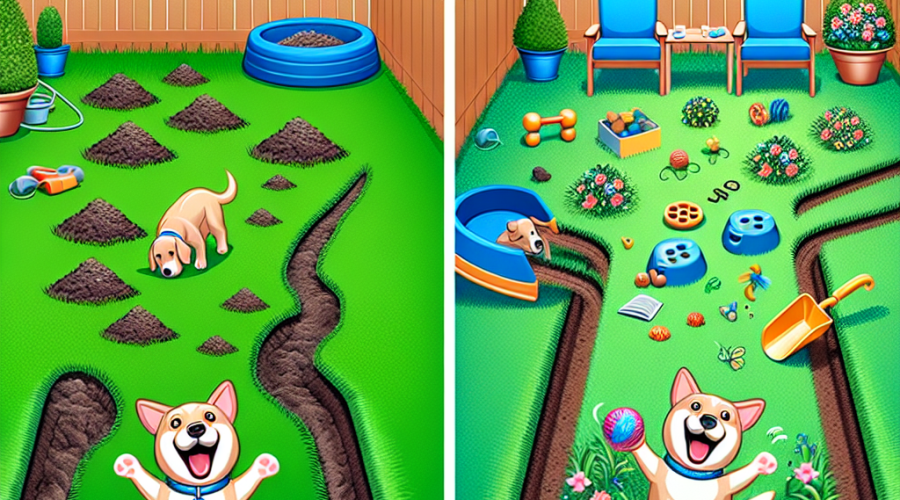How to Stop Your Dog’s Digging in Just Days
If you’ve ever found yourself staring at a garden that looks more like a minefield thanks to your furry friend, you’re not alone. Many dog owners face the challenge of discouraging their pets from turning their backyard into a series of excavation sites. But fear not, for turning this behaviour around might be easier than you think. With a blend of understanding, training, and a touch of creativity, you can guide your dog away from their digging habits in just a matter of days.
Understanding why your dog takes to digging with such enthusiasm is the first step. Dogs dig for a myriad of reasons – it could be an instinctual call from their wild ancestors, a quest for cooler ground on a hot day, or even boredom. Identifying the root cause of this behaviour is crucial. Just like us humans, dogs need mental and physical stimulation, and digging might just be their way of telling you they’re not getting enough of it.
Creating a dig-free garden doesn’t mean you have to compromise on your dog’s natural instincts. Instead, it’s about redirecting those instincts in a more constructive way. Imagine swapping a spoon for a paintbrush; it’s still in their paw, but now it’s creating art, not chaos.
A popular strategy is setting up a designated digging zone. It might sound counterintuitive – encouraging digging to stop digging? But think of it as a sandbox for toddlers. It’s their little piece of paradise where rules are slightly bent in favour of fun. Fill a corner of your garden with soft soil or sand, bury some toys for them to find, and watch their digging desires be fulfilled without upturning your prized petunias.
Training plays a pivotal role too. Every time your dog starts to dig outside of their designated zone, a firm “no” followed by redirecting them to the correct spot teaches them where it’s acceptable to dig. Consistency is key. Dogs learn through repetition, and being consistent with your commands will help cement the behaviour you want to see. Reward them when they dig in the right spot – treats, praise, extra playtime – whatever makes your dog’s tail wag with joy.
And what about those times you’re not there to supervise? Boredom is a major catalyst for digging. Ensuring your dog has plenty of toys and engaging activities to keep them occupied when you’re not around can significantly reduce the temptation to start landscaping your garden. From puzzle toys filled with treats to durable chew toys, keeping their mind and jaws busy is a fantastic preventative measure.
Dogs are social animals, and sometimes, they dig simply to be closer to you. If your dog digs along the fence line, it might be trying to create a path to you. Spending quality time together, exercising, and playing can satisfy their social needs and reduce unwanted digging. It’s like planting a tree; the more love and care you give it, the stronger and more beautiful it grows, needing less intervention as it thrives.
Another often overlooked aspect is the physical environment. If your garden becomes too hot, dogs might dig to find cooler ground. Providing ample shade and water can eliminate this need. Similarly, if pests like moths or bugs are attracting your dog’s attention to certain spots, addressing these pest issues can remove the temptation to dig.
Last but not least, patience and understanding go a long way. Changing any behaviour doesn’t happen overnight. Celebrate the small victories and remember that every dog has its unique personality and pace of learning. Visualise your garden not just as a space of beauty, but as a shared haven, where both you and your dog can find joy and peace. It’s not just about stopping a behaviour but enriching your bond with your dog, making every moment together even more precious.
Transforming your dog’s digging habits is very much achievable with a bit of know-how, patience, and love. Understand the why, offer alternatives, engage in training, ensure their environment is enriching, and spend quality time together. Remember, it’s not just about the destination but the journey you embark on together. With these strategies, not only will your garden thrive, but so will your relationship with your furry best friend. Here’s to fewer holes and more whole moments with your dog!
FAQs
Q: What is the first step I should take to curb my dog’s digging behaviour?
A: Begin by observing when and where your dog tends to dig the most. This will help you understand the underlying cause, whether it’s boredom, hunting instincts, or seeking comfort.
Q: Can changing my dog’s diet impact their digging habits?
A: Yes, sometimes nutritional deficiencies can lead to unusual behaviours like digging. Ensuring your dog has a balanced diet might reduce their need to dig.
Q: How effective is creating a designated digging area in stopping unwanted digging?
A: Designating a specific area for your dog to dig can significantly redirect their digging instincts. It provides them with a safe outlet without damaging your garden or yard.
Q: What role does exercise play in preventing my dog from digging?
A: Adequate physical and mental exercise is crucial in curbing digging behaviours. Dogs often dig out of boredom or excess energy, so regular exercise can help mitigate this.
Q: Are there any deterrents I can use to keep my dog from digging in certain areas?
A: Yes, using safe, natural deterrents like citrus peels or vinegar can help keep your dog away from specific areas. However, these should be used as part of a broader training strategy for best results.

